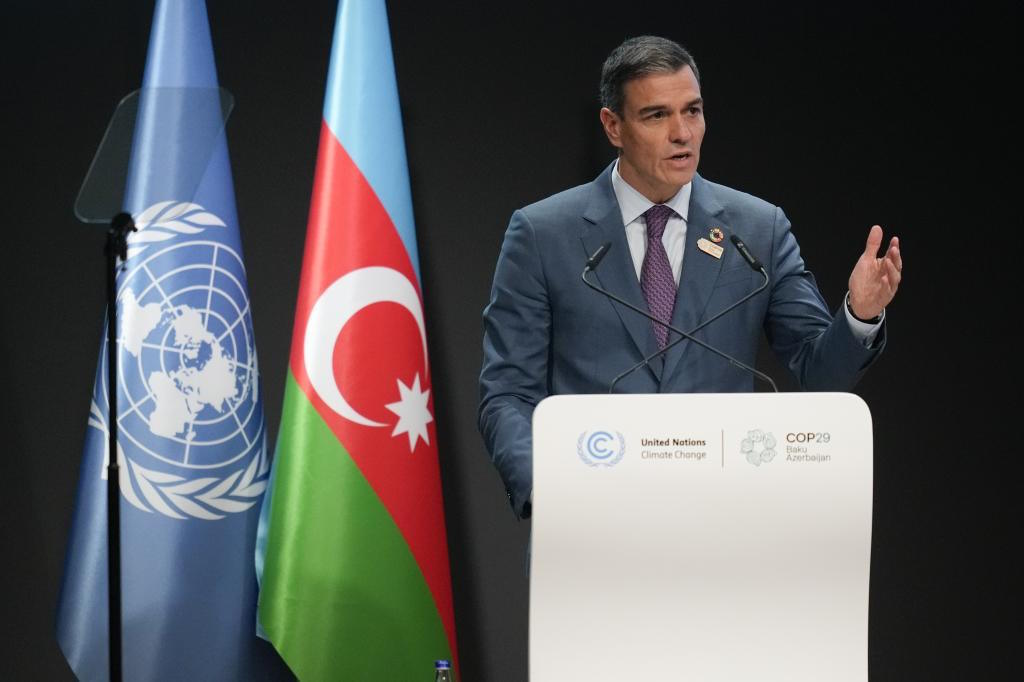The international agenda of Pedro Sánchez has been disrupted by the catastrophe caused by the DANA in the Valencian Community. However, the President of the Government wanted to maintain his presence at the Climate Summit being held these days in Baku, Azerbaijan, where he remembered the victims of the floods and used the example of what happened in Spain to denounce that climate change "kills". During his interventions on Tuesday, Sánchez also emphasized the need to tax fossil fuels more and focus on maritime, air, and diesel transport.
The DANA has been very present in the speeches, in English, delivered by Sánchez. For the Government, COP29 was a key meeting in its strategy to confront what they call "climate change deniers" and also the misinformation and rumors that have been spreading in Spain these days due to the DANA. "I have just witnessed one of the greatest climatic disasters in the history of Spain. More than 200 people have lost their lives in my country. And they are the reason why I am here today to amplify the message that climate change kills."
This message was reiterated during his speech in Spanish before the COP29 plenary. "Climate change kills. Just last year, it killed over 300,000 people and has just contributed to the death of 222 compatriots in my country, in the greatest natural disaster in our history. A disaster that, according to initial investigations, would have been less likely and less intense without the effect of climate change."
Valencia has been very present in Baku. As a tribute to the victims and as an example, as the President of the Government has pointed out, of the fatal consequences of not addressing climate change. Taking action. This message was combined with the need to heed science. "At this moment, there is only one thing as important as helping the victims of this terrible tragedy. Preventing it from happening again. Preventing natural disasters from recurring and multiplying."
Sánchez has called for ambition to combat climate change, both in terms of financing and political ambition. "The international goal of climate financing will measure our commitment to future generations, and we are all aware that we need to be much more ambitious if we want to achieve goals in both mitigation and adaptation." For the Spanish Prime Minister, "sustainable development and the fight against climate change are two sides of the same coin."
Sánchez has called for a focus on fiscal justice. "When we do not tax fossil fuels enough, we are indirectly subsidizing them. These subsidies are huge and unfair. We have to do it in a way that can be taxed with the principle of polluter pays. So that the effects are positive for the general population and for the fight against climate change."
In his approach, he considered addressing the taxation of maritime, air, and diesel transport.
In his speech to the plenary, Sánchez has called on all countries to move in the same direction because, he emphasized, it is not a threat, but a reality for the world. "This existential threat is already evident to everyone. It has moved from academic articles to our televisions and windows. But, even so, at this crucial moment for humanity, we see many governments hesitating. Slowing down when we need to move faster. Or even denying the evidence, turning around, and walking backward."
This reflection gains more relevance precisely after the victory in the USA of Donald Trump, who has denied the impact of climate change on more than one occasion and has promised to withdraw his country from the global climate agreement.
Spain has shown its commitment to continue moving forward with the Ecological Transition and has set an example. "We have reduced our emissions by 40% and our consumption of natural resources." Sánchez has appealed to his colleagues, in a context of international geopolitical uncertainty, not to release the accelerator pedal to hit the brakes: "Spain will comply. I guarantee it. We will continue to transform ourselves and by 2050 we will be a carbon-neutral society and respectful of environmental limits. But it will be of little use if only some of us do it and not everyone. Because the planet has only one atmosphere and all its climate patterns are interconnected. That is why I ask you, as one of the most vulnerable countries in the world to climate change, to act."
